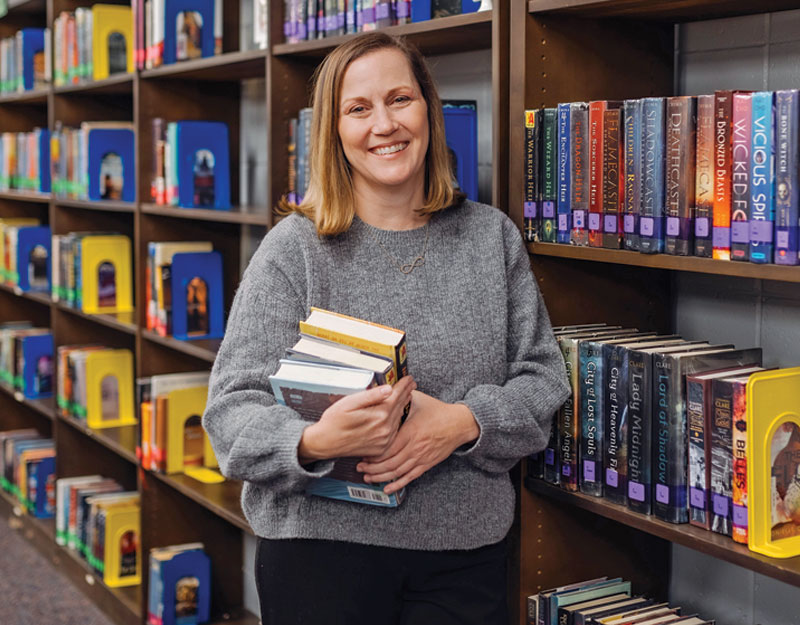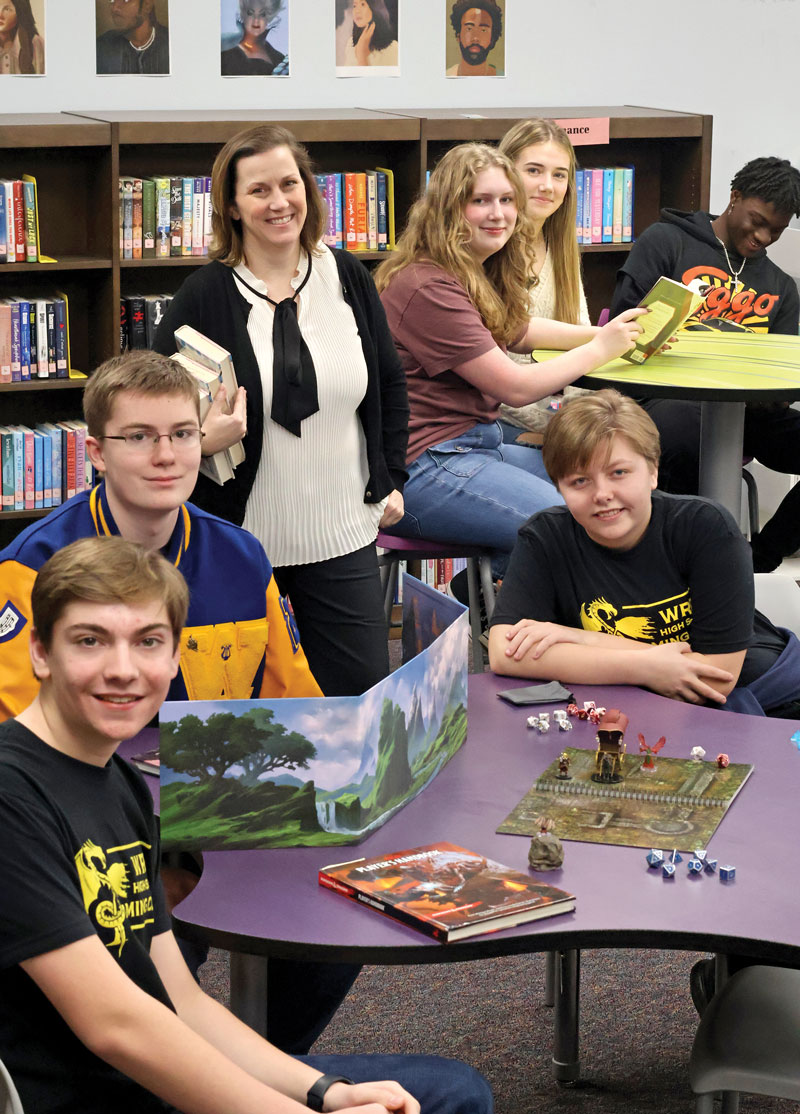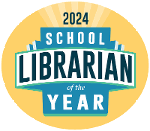Tamara Cox: A Leader for All | 2024 School Librarian of the Year Finalist
From testifying before the state legislature’s education committee to creating a library refuge that helps kids love books, Cox personifies leadership.
School Librarian of the Year Finalist
 |
Tamara Cox , Librarian, Wren High School, Piedmont, SCPhoto by Mara Diaz Photography |
|
School Librarian School Librarian |
Tamara Cox has had an oversize impact on librarianship in her home state of South Carolina.
From testifying in front of the state legislature’s education committee to serving as president of the South Carolina Association of School Librarians and working to help bring more librarians into the field, Cox is a true library leader. It’s one of the reasons she was a finalist for South Carolina Teacher of the Year in 2019, the first librarian to be recognized by the state, and why she is a Finalist for the 2024 School Librarian of the Year Award, presented by SLJ and sponsored by Scholastic.
But Cox is a small-town educator at heart. She lives and works in Anderson County, the same rural community where she grew up—the kind of place, she says, you see cows every morning on the way to school. She has also taught in the district her entire career. In fact, when she first started teaching, it was in the same middle school she herself attended.
“It’s a community where a lot of life revolves around school, so schools are very important to the area,” Cox says.
Cox has been the media specialist at Wren High School for a decade, and in that time, she has worked to create a modern library for her 1,300 students. Despite a book budget of less than $17 per student, Cox has curated a diverse and inclusive collection, with more than 7,000 print and electronic items. While the student body is 80 percent white, along with 7 percent Black and 6.5 percent Hispanic students, and 15 percent receiving free or reduced-cost lunch, the library has become representative of the wider world.
When she took over, Cox says, many students were scared of the library. They had to pass through a security gate to enter and were often greeted with an inquiry about where their pass was. The first thing Cox did was remove the magnetic security gate. She also abolished late fees, completed a diversity audit, and genrefied the fiction selection, all of which resulted in an eight-year reduction in the collection’s age and a 30 percent increase in circulation.
“I try to make it a friendly and welcoming place,” Cox says. “When students walk in the door, I try to speak to them, not ask where their pass is, and make sure they know it’s OK to come into the library and I want them to come to the library.”
Michelle Marte, a parent of three Wren students, described how Cox created a library that became “a place of refuge and information” for her kids.
After Marte’s family moved to South Carolina, “that first year was especially difficult for my daughter,” Marte wrote. “Mrs. Cox went out of her way to help her feel safe and wanted in the library.”
 |
Photo courtesy of Wren High School |
That attitude extends to all her students, and Cox find creative ways to serve the entire Wren community. She partners with a local independent bookstore for author visits. She brings in community experts as part of a library lecture series addressing life skills, such as writing a résumé or buying a home. During exam periods, Cox schedules a local nonprofit to bring in therapy dogs to visit with students.
But one of her most popular programs is the student book club. Cox puts a unique spin on this traditional activity. Each year, book club members read the nominees for the South Carolina Book Awards. When it comes time for them to vote on their favorites, Cox partners with the county election committee to bring in an actual voting machine.
“Some of them are old enough to register or work at the polls, so I want to demystify the voting process and help those old enough to think about voting,” Cox says.
Cox has become a vocal advocate for librarians across the state, including serving as president of the South Carolina Association of School Librarians (SCASL). Through her advocacy work, Cox has organized state and national events, including the Share Your Story campaign, for which she collects accounts of the positive work of school, public, and academic librarians around South Carolina to share with state legislators and other decision-makers.
Cox also helped form Freedom to Read SC, a coalition of educational organizations, civil rights groups, and community members—including the ACLU of South Carolina, the League of Women Voters of South Carolina, and the SCASL—to speak out against book bans and mobilize people to attend school board meetings in defense of free speech.
“I can’t overstate the impact and importance of Tamara’s leadership,” says Josh Malkin, senior advocacy strategist for the ACLU of South Carolina. “Tamara has been the epitome of a role model and has taken it upon herself to fight for academic freedom and has let her colleagues know they can, too. I think we have so many librarians feel empowered because they see Tamara lead the way and fight back.”
Not only are school librarians under fire in the state, but they are also in short supply. School librarians have been on the South Carolina list of critical-need subject areas for over 15 years.
To get more librarians into classrooms, Cox has partnered with the University of South Carolina, where she received her master’s degree, to recruit new librarians into the field. She regularly hosts informational meetings, speaks with student teachers and education majors, and brings on interns who are finishing their graduate degrees.
“She is just so wonderful and such a great inspiration for the profession,” says Valerie Byrd Fort, an instructor in the College of Information and Communications at the University of South Carolina. “I think what is so impressive about Tamara is that anytime there is a need for school librarians to have a voice and do things to make themselves known, she doesn’t have to think about it; she just does it. And it’s just amazing how quickly she can put something together that is beautiful and effective.”
Despite her work around the state, it’s the impact she has in her own library that makes all her work worthwhile, Cox says. “When you connect a student with a book and they come back and tell you it was perfect, that’s the [most rewarding].”
Recently, one of her students discovered graphic novels. “He’s a junior. So often you think you know who your readers are, but I never give up. This child is close to graduating and has just found the books he loves.”
“He’s so proud of himself,” she adds, “which is the best part.”
|
An annual award presented by SLJ and sponsored by Scholastic, the School Librarian of the Year Award honors a K–12 library professional for exemplary service to students, creativity, outreach, and use of technology tools, along with outstanding teacher collaboration and student engagement. This year’s submissions were judged by Julie Stivers, 2023 School Librarian of the Year; Dr. Kevin M. Washburn, director, library programs, DC Public Schools; a Scholastic representative; and SLJ editors. Learn more about the award and past winners at slj.com/SLOTY. |
Andrew Bauld is a freelance writer covering education.
RELATED
The job outlook in 2030: Librarians will be in demand
The job outlook in 2030: Librarians will be in demand
ALREADY A SUBSCRIBER? LOG IN
We are currently offering this content for free. Sign up now to activate your personal profile, where you can save articles for future viewing

 ABOUT THE AWARD
ABOUT THE AWARD



Add Comment :-
Be the first reader to comment.
Comment Policy:
Comment should not be empty !!!